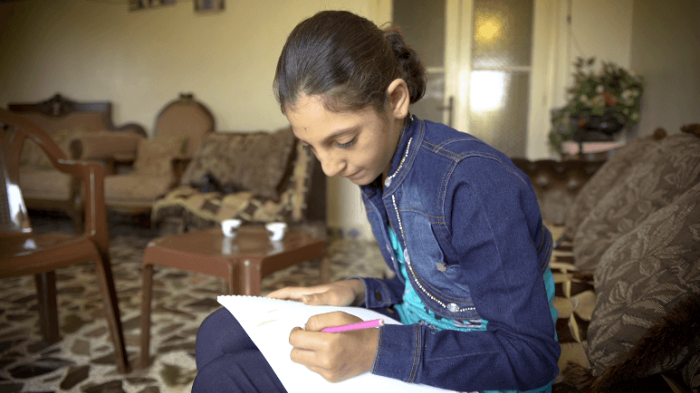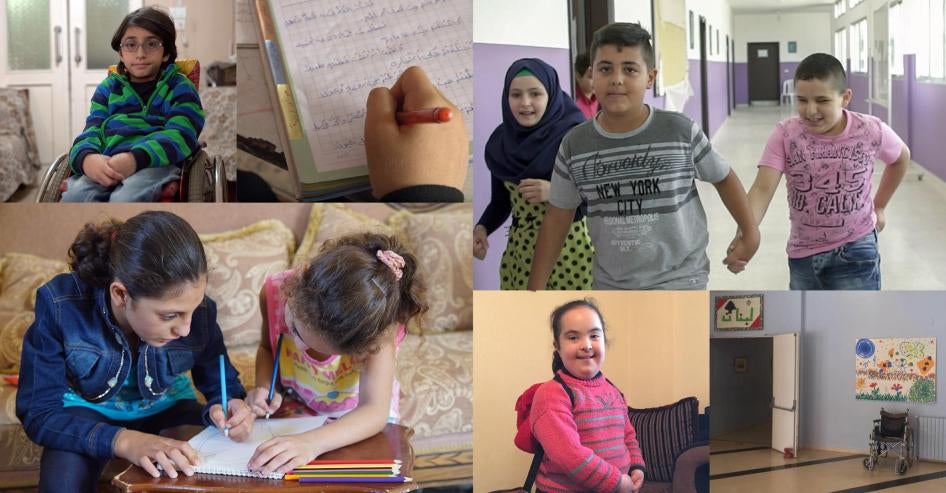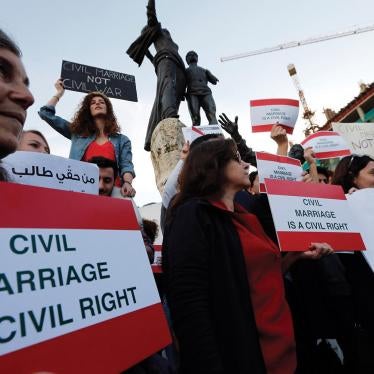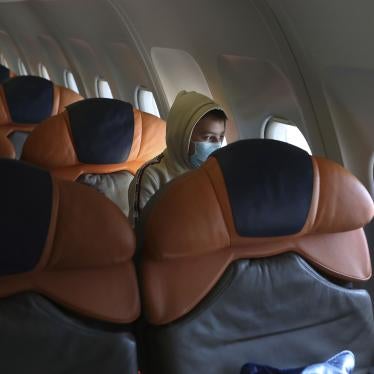
(Beirut) – Lebanon’s public education system discriminates against children with disabilities, Human Rights Watch said in a report released today. Children with disabilities are often denied admission to schools because of their disability. And for those who manage to enroll, most schools do not take reasonable steps to provide them with a quality education. Instead, many children with disabilities in Lebanon attend institutions, which are not mandated to provide an education, or receive no education at all.
The 75-page report, “‘I Would Like to Go to School’: Barriers to Education for Children with Disabilities in Lebanon,” finds that although Lebanese law bars schools from discriminating against children with disabilities, public and private schools exclude many children with disabilities. For those allowed to enroll, schools often lack reasonable accommodations, such as modifications to the classroom environment and curricula, or teaching methods to address children’s needs. Schools also require the families of children with disabilities to pay extra fees and expenses that in effect are discriminatory.
“Discriminatory admissions practices are robbing Lebanese children with disabilities of an education,” said Lama Fakih, deputy Middle East director at Human Rights Watch. “Without any real option to get a quality inclusive education, thousands of children with disabilities are being left behind.”
Under both Lebanese and international law, all children should have access to a quality education without discrimination. Lebanon’s Law No. 220, passed in 2000, guarantees everyone with a disability the right to education and other services, but it is not being put into practice, Human Rights Watch found. The educational path of children with disabilities in Lebanon is strewn with logistical, social, and economic pitfalls that mean they often face a compromised school experience – if they can enroll at all.
Human Rights Watch interviewed more than 200 children with disabilities and their families, government officials, disability rights experts, and education staff, and visited 11 public and private schools, 17 institutions, and 6 service providers.
Families said school officials gave various, sometimes brutal, reasons for denying their children admission. “While exclusion might not be a policy, it has become the custom,” said one disability rights expert.
Few schools in Lebanon are physically accessible and the government does little to provide accommodations children may need to succeed. Human Rights Watch found in nearly all cases that teachers and school administrators lacked training in inclusive education and that schools lacked funding to provide sufficient staff, in particular aides who can provide direct support to one or more children. Inclusive education involves children with disabilities studying in their community schools with reasonable support for academic and other forms of achievement.
“We are trying to do the best we can,” one teacher said. “We don’t have resources or the tools we need.”
For children who are not able to enroll in schools, 103 specialized institutions funded by the Social Affairs Ministry serve as the alternative for children with disabilities. Yet the educational resources at many of these institutions are of poor quality. And a lack of monitoring, poor evaluation mechanisms, and a dearth of appropriate resources raise serious concerns about whether these institutions fulfill children’s right to an education.
Conditions in some of the institutions are problematic, Human Rights Watch found. At two residential institutions visited, there was no separation between children and unrelated adult residents, providing inadequate privacy and supervision. In many cases, distance and the cost of transportation means that many children end up sleeping at institutions, effectively separating them from their families and communities for significant amounts of time.
There is no clear data on the total number of children with disabilities in Lebanon nor on how many are in school. Of the 8,558 Lebanese ages 5 to 14 registered with the Social Affairs Ministry as children with disabilities, 3,806 are in government-funded institutions, with a few others spread among public and private schools.
However other data raise concerns that tens of thousands of Lebanese children with disabilities may be excluded from Lebanon’s official disability registration. The United Nations Children’s Fund (UNICEF), World Health Organization, and World Bank estimate that 5 percent of people under age 14 has a disability, which would put a conservative estimate of the number of Lebanese children ages 5 to 14 with a disability at 40,000.
In recent years, the Lebanese government has taken steps in the right direction. The Education Ministry has made some efforts to include children with learning disabilities in public schools. It is planning a 2018 pilot program under which 30 public schools will include children with learning disabilities and 6 will enroll children with visual, hearing, physical, and moderate intellectual disabilities.
The right to an education applies to all children, including those with disabilities. As a state party to the Conventions on the Rights of the Child and the International Covenant on Economic, Social and Cultural Rights, Lebanon is obligated to provide free compulsory primary education and access to secondary education without discrimination to all children. Inclusive education benefits all students, not only students with disabilities. A system that meets the diverse needs of all students benefits all learners and is a means to achieve high-quality education and can promote a more inclusive society.
The obstacles that children with disabilities face are not unique to Lebanon. The UN Education, Scientific and Cultural Organization (UNESCO) estimates that more than one-third of the 121 million children at the primary and lower-secondary level who are out of school worldwide are children with disabilities.
The Lebanese government should implement and enforce existing disability rights legislation, Human Rights Watch said. The Education Ministry should provide inclusive education in all its schools in a way that achieves maximum inclusion of children with disabilities in mainstream public and private schools, including by adapting school curricula and hiring experienced personnel. The Social Affairs Ministry should create and implement a time-bound action plan for deinstitutionalization.
“Eighteen years after Lebanon passed a law ensuring children with disabilities could get an education, almost nothing has been done to make this a reality,” Fakih said. “Lebanon should urgently end its dependence on institutions, and ensure that children with disabilities can get a quality education in a classroom alongside their peers.”








